Effective Management Communication: Personal to Crisis Strategies
VerifiedAdded on 2023/06/04
|9
|2151
|437
Essay
AI Summary
This essay provides a comprehensive overview of management communication, addressing personal and interpersonal skills, formal communication channels, sustainability, and crisis communication strategies. It highlights the importance of effective communication in achieving organizational goals, managing the workforce, and maintaining a positive reputation. The discussion covers grapevine communication, formal and informal communication channels, the role of communication in sustainability projects, and strategies for protecting an organization's reputation during a crisis. The essay emphasizes the need for clear and transparent communication, ethical responsibility, and the integration of sustainability practices into organizational communication strategies. It concludes with recommendations for developing interpersonal skills, balancing formal and informal communication, and implementing carbon footprint communication methods for CSR.
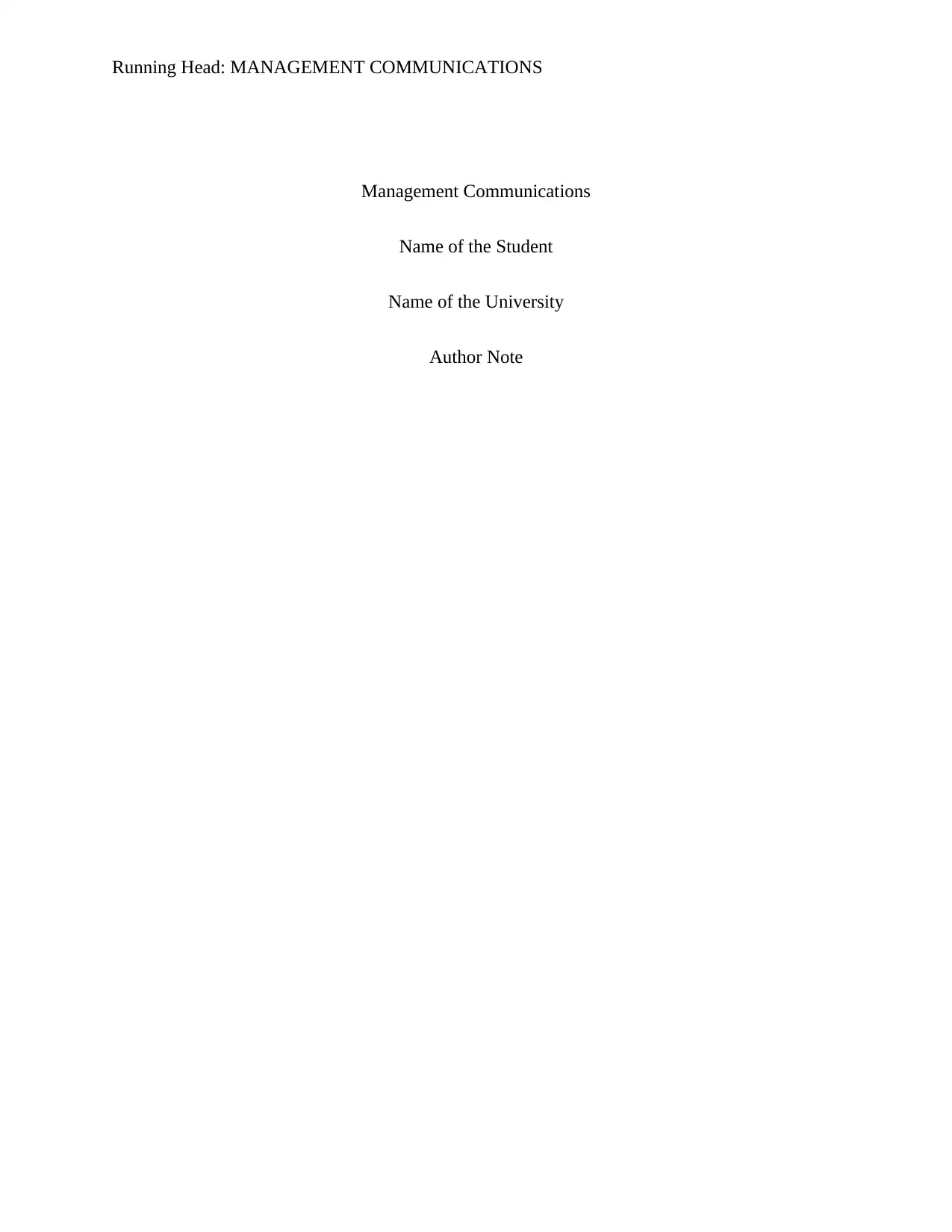
Running Head: MANAGEMENT COMMUNICATIONS
Management Communications
Name of the Student
Name of the University
Author Note
Management Communications
Name of the Student
Name of the University
Author Note
Paraphrase This Document
Need a fresh take? Get an instant paraphrase of this document with our AI Paraphraser
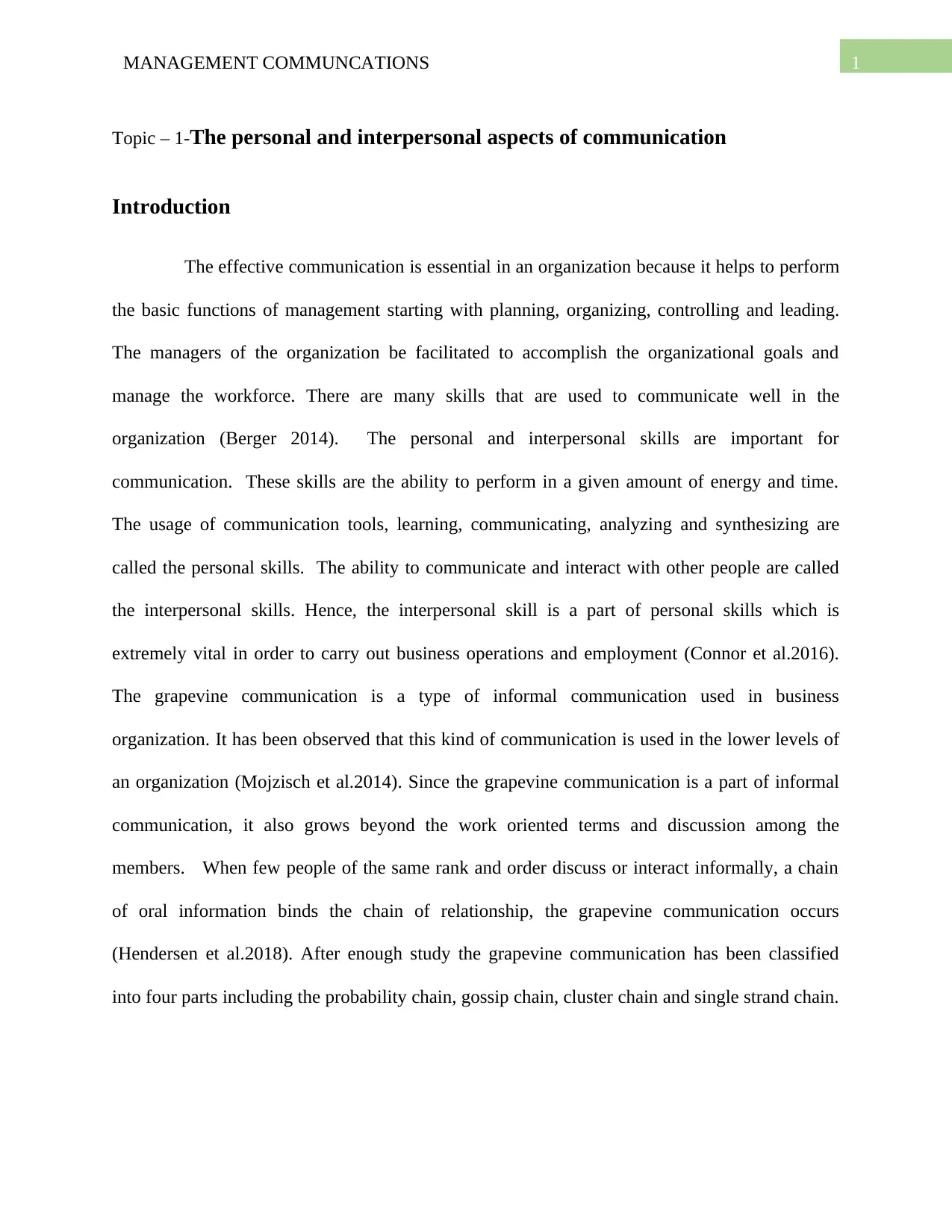
1MANAGEMENT COMMUNCATIONS
Topic – 1-The personal and interpersonal aspects of communication
Introduction
The effective communication is essential in an organization because it helps to perform
the basic functions of management starting with planning, organizing, controlling and leading.
The managers of the organization be facilitated to accomplish the organizational goals and
manage the workforce. There are many skills that are used to communicate well in the
organization (Berger 2014). The personal and interpersonal skills are important for
communication. These skills are the ability to perform in a given amount of energy and time.
The usage of communication tools, learning, communicating, analyzing and synthesizing are
called the personal skills. The ability to communicate and interact with other people are called
the interpersonal skills. Hence, the interpersonal skill is a part of personal skills which is
extremely vital in order to carry out business operations and employment (Connor et al.2016).
The grapevine communication is a type of informal communication used in business
organization. It has been observed that this kind of communication is used in the lower levels of
an organization (Mojzisch et al.2014). Since the grapevine communication is a part of informal
communication, it also grows beyond the work oriented terms and discussion among the
members. When few people of the same rank and order discuss or interact informally, a chain
of oral information binds the chain of relationship, the grapevine communication occurs
(Hendersen et al.2018). After enough study the grapevine communication has been classified
into four parts including the probability chain, gossip chain, cluster chain and single strand chain.
Topic – 1-The personal and interpersonal aspects of communication
Introduction
The effective communication is essential in an organization because it helps to perform
the basic functions of management starting with planning, organizing, controlling and leading.
The managers of the organization be facilitated to accomplish the organizational goals and
manage the workforce. There are many skills that are used to communicate well in the
organization (Berger 2014). The personal and interpersonal skills are important for
communication. These skills are the ability to perform in a given amount of energy and time.
The usage of communication tools, learning, communicating, analyzing and synthesizing are
called the personal skills. The ability to communicate and interact with other people are called
the interpersonal skills. Hence, the interpersonal skill is a part of personal skills which is
extremely vital in order to carry out business operations and employment (Connor et al.2016).
The grapevine communication is a type of informal communication used in business
organization. It has been observed that this kind of communication is used in the lower levels of
an organization (Mojzisch et al.2014). Since the grapevine communication is a part of informal
communication, it also grows beyond the work oriented terms and discussion among the
members. When few people of the same rank and order discuss or interact informally, a chain
of oral information binds the chain of relationship, the grapevine communication occurs
(Hendersen et al.2018). After enough study the grapevine communication has been classified
into four parts including the probability chain, gossip chain, cluster chain and single strand chain.
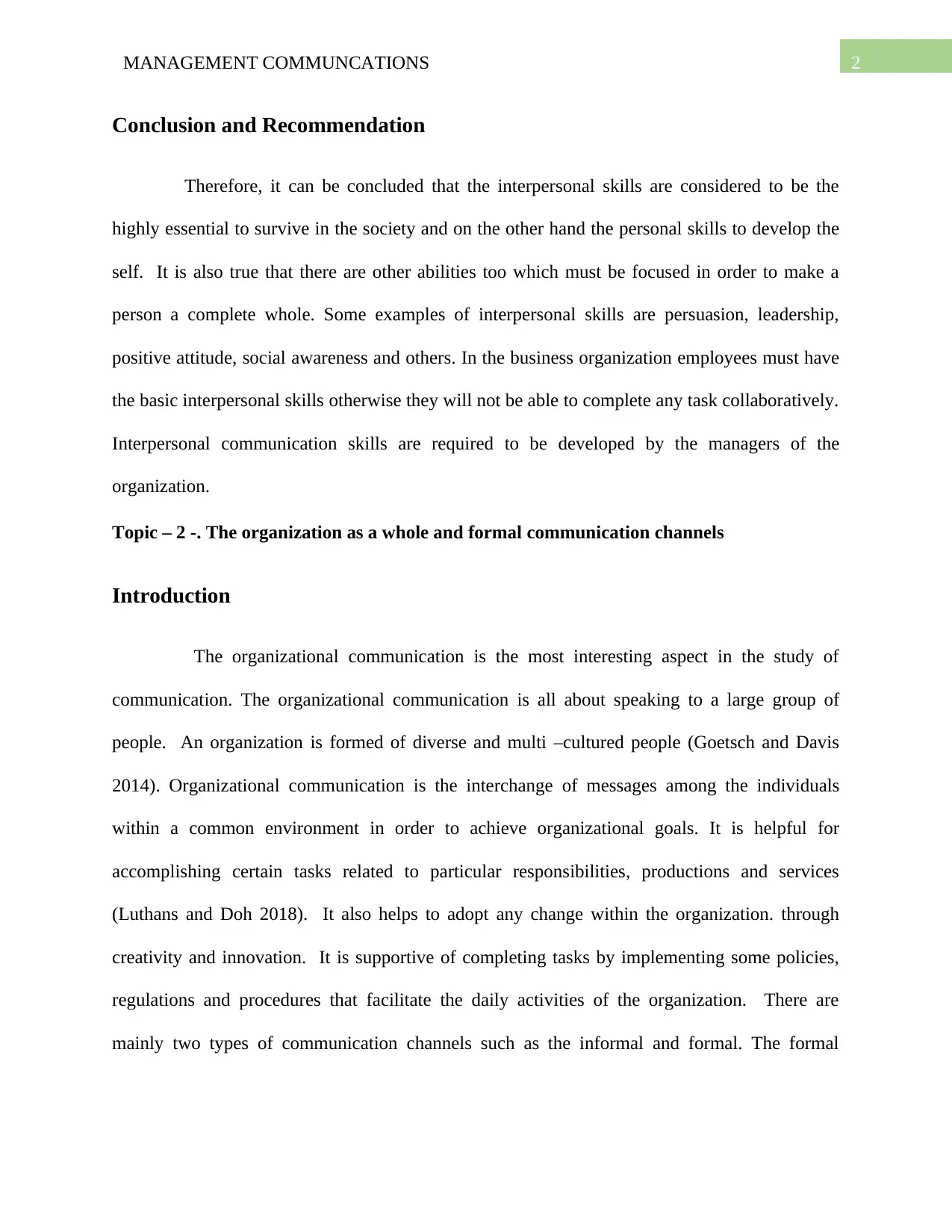
2MANAGEMENT COMMUNCATIONS
Conclusion and Recommendation
Therefore, it can be concluded that the interpersonal skills are considered to be the
highly essential to survive in the society and on the other hand the personal skills to develop the
self. It is also true that there are other abilities too which must be focused in order to make a
person a complete whole. Some examples of interpersonal skills are persuasion, leadership,
positive attitude, social awareness and others. In the business organization employees must have
the basic interpersonal skills otherwise they will not be able to complete any task collaboratively.
Interpersonal communication skills are required to be developed by the managers of the
organization.
Topic – 2 -. The organization as a whole and formal communication channels
Introduction
The organizational communication is the most interesting aspect in the study of
communication. The organizational communication is all about speaking to a large group of
people. An organization is formed of diverse and multi –cultured people (Goetsch and Davis
2014). Organizational communication is the interchange of messages among the individuals
within a common environment in order to achieve organizational goals. It is helpful for
accomplishing certain tasks related to particular responsibilities, productions and services
(Luthans and Doh 2018). It also helps to adopt any change within the organization. through
creativity and innovation. It is supportive of completing tasks by implementing some policies,
regulations and procedures that facilitate the daily activities of the organization. There are
mainly two types of communication channels such as the informal and formal. The formal
Conclusion and Recommendation
Therefore, it can be concluded that the interpersonal skills are considered to be the
highly essential to survive in the society and on the other hand the personal skills to develop the
self. It is also true that there are other abilities too which must be focused in order to make a
person a complete whole. Some examples of interpersonal skills are persuasion, leadership,
positive attitude, social awareness and others. In the business organization employees must have
the basic interpersonal skills otherwise they will not be able to complete any task collaboratively.
Interpersonal communication skills are required to be developed by the managers of the
organization.
Topic – 2 -. The organization as a whole and formal communication channels
Introduction
The organizational communication is the most interesting aspect in the study of
communication. The organizational communication is all about speaking to a large group of
people. An organization is formed of diverse and multi –cultured people (Goetsch and Davis
2014). Organizational communication is the interchange of messages among the individuals
within a common environment in order to achieve organizational goals. It is helpful for
accomplishing certain tasks related to particular responsibilities, productions and services
(Luthans and Doh 2018). It also helps to adopt any change within the organization. through
creativity and innovation. It is supportive of completing tasks by implementing some policies,
regulations and procedures that facilitate the daily activities of the organization. There are
mainly two types of communication channels such as the informal and formal. The formal
⊘ This is a preview!⊘
Do you want full access?
Subscribe today to unlock all pages.

Trusted by 1+ million students worldwide
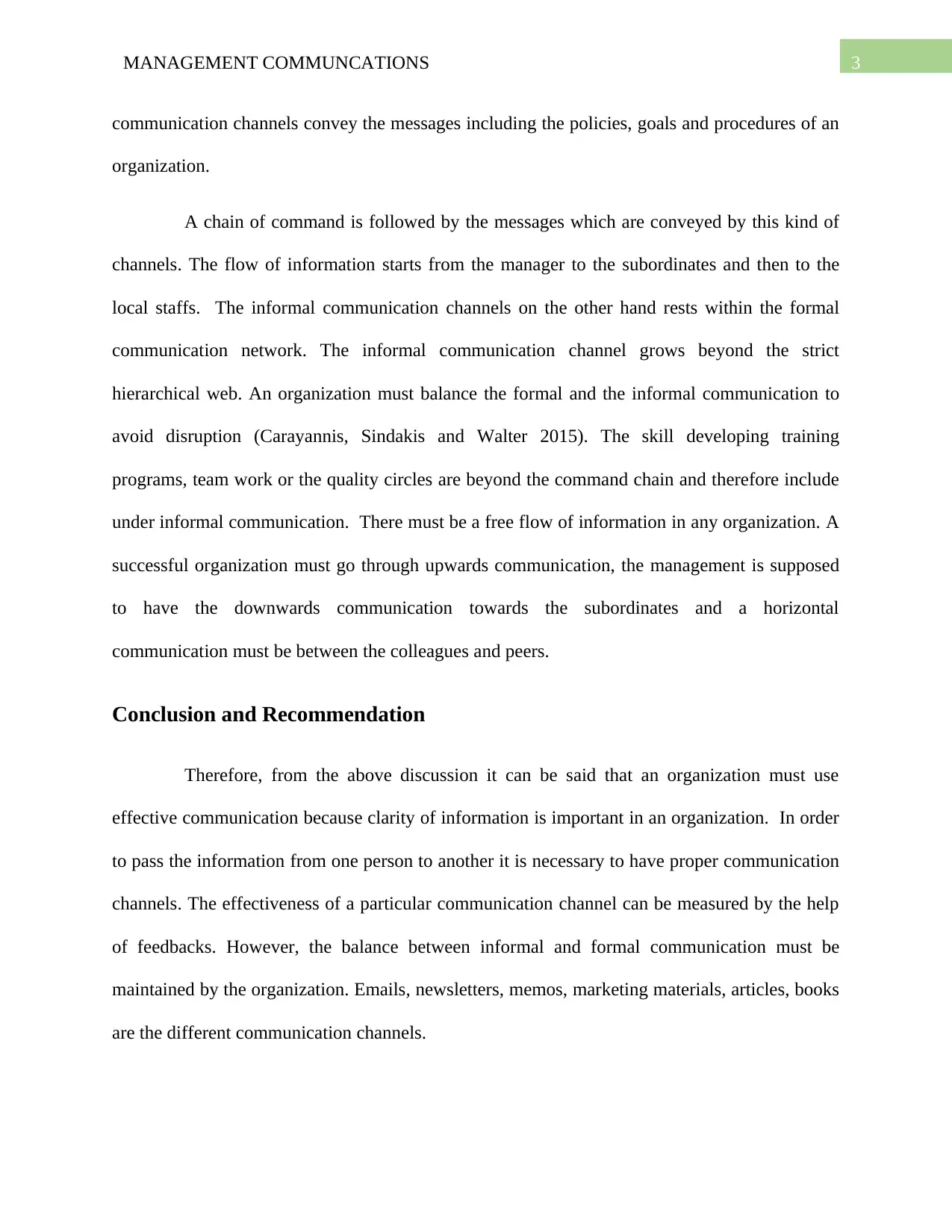
3MANAGEMENT COMMUNCATIONS
communication channels convey the messages including the policies, goals and procedures of an
organization.
A chain of command is followed by the messages which are conveyed by this kind of
channels. The flow of information starts from the manager to the subordinates and then to the
local staffs. The informal communication channels on the other hand rests within the formal
communication network. The informal communication channel grows beyond the strict
hierarchical web. An organization must balance the formal and the informal communication to
avoid disruption (Carayannis, Sindakis and Walter 2015). The skill developing training
programs, team work or the quality circles are beyond the command chain and therefore include
under informal communication. There must be a free flow of information in any organization. A
successful organization must go through upwards communication, the management is supposed
to have the downwards communication towards the subordinates and a horizontal
communication must be between the colleagues and peers.
Conclusion and Recommendation
Therefore, from the above discussion it can be said that an organization must use
effective communication because clarity of information is important in an organization. In order
to pass the information from one person to another it is necessary to have proper communication
channels. The effectiveness of a particular communication channel can be measured by the help
of feedbacks. However, the balance between informal and formal communication must be
maintained by the organization. Emails, newsletters, memos, marketing materials, articles, books
are the different communication channels.
communication channels convey the messages including the policies, goals and procedures of an
organization.
A chain of command is followed by the messages which are conveyed by this kind of
channels. The flow of information starts from the manager to the subordinates and then to the
local staffs. The informal communication channels on the other hand rests within the formal
communication network. The informal communication channel grows beyond the strict
hierarchical web. An organization must balance the formal and the informal communication to
avoid disruption (Carayannis, Sindakis and Walter 2015). The skill developing training
programs, team work or the quality circles are beyond the command chain and therefore include
under informal communication. There must be a free flow of information in any organization. A
successful organization must go through upwards communication, the management is supposed
to have the downwards communication towards the subordinates and a horizontal
communication must be between the colleagues and peers.
Conclusion and Recommendation
Therefore, from the above discussion it can be said that an organization must use
effective communication because clarity of information is important in an organization. In order
to pass the information from one person to another it is necessary to have proper communication
channels. The effectiveness of a particular communication channel can be measured by the help
of feedbacks. However, the balance between informal and formal communication must be
maintained by the organization. Emails, newsletters, memos, marketing materials, articles, books
are the different communication channels.
Paraphrase This Document
Need a fresh take? Get an instant paraphrase of this document with our AI Paraphraser
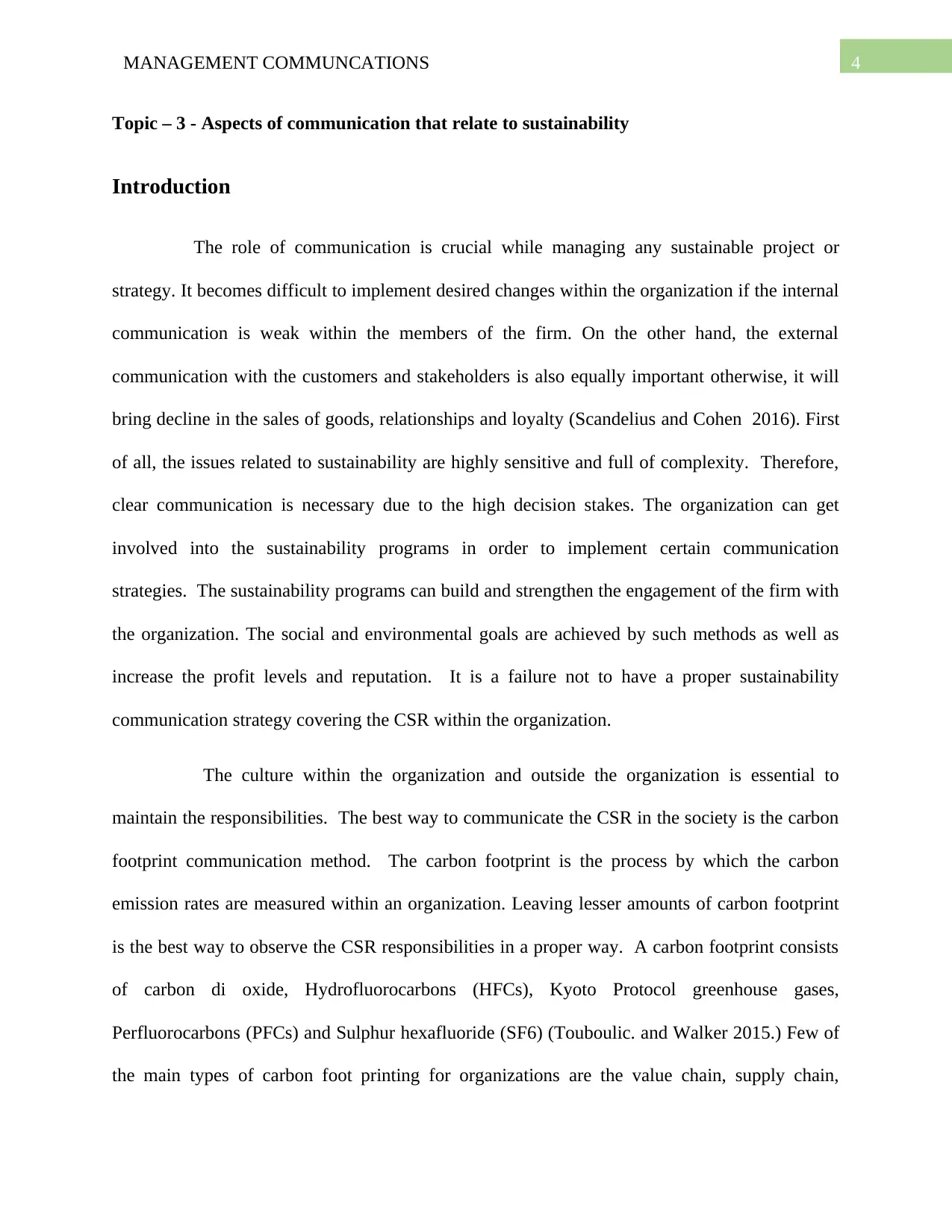
4MANAGEMENT COMMUNCATIONS
Topic – 3 - Aspects of communication that relate to sustainability
Introduction
The role of communication is crucial while managing any sustainable project or
strategy. It becomes difficult to implement desired changes within the organization if the internal
communication is weak within the members of the firm. On the other hand, the external
communication with the customers and stakeholders is also equally important otherwise, it will
bring decline in the sales of goods, relationships and loyalty (Scandelius and Cohen 2016). First
of all, the issues related to sustainability are highly sensitive and full of complexity. Therefore,
clear communication is necessary due to the high decision stakes. The organization can get
involved into the sustainability programs in order to implement certain communication
strategies. The sustainability programs can build and strengthen the engagement of the firm with
the organization. The social and environmental goals are achieved by such methods as well as
increase the profit levels and reputation. It is a failure not to have a proper sustainability
communication strategy covering the CSR within the organization.
The culture within the organization and outside the organization is essential to
maintain the responsibilities. The best way to communicate the CSR in the society is the carbon
footprint communication method. The carbon footprint is the process by which the carbon
emission rates are measured within an organization. Leaving lesser amounts of carbon footprint
is the best way to observe the CSR responsibilities in a proper way. A carbon footprint consists
of carbon di oxide, Hydrofluorocarbons (HFCs), Kyoto Protocol greenhouse gases,
Perfluorocarbons (PFCs) and Sulphur hexafluoride (SF6) (Touboulic. and Walker 2015.) Few of
the main types of carbon foot printing for organizations are the value chain, supply chain,
Topic – 3 - Aspects of communication that relate to sustainability
Introduction
The role of communication is crucial while managing any sustainable project or
strategy. It becomes difficult to implement desired changes within the organization if the internal
communication is weak within the members of the firm. On the other hand, the external
communication with the customers and stakeholders is also equally important otherwise, it will
bring decline in the sales of goods, relationships and loyalty (Scandelius and Cohen 2016). First
of all, the issues related to sustainability are highly sensitive and full of complexity. Therefore,
clear communication is necessary due to the high decision stakes. The organization can get
involved into the sustainability programs in order to implement certain communication
strategies. The sustainability programs can build and strengthen the engagement of the firm with
the organization. The social and environmental goals are achieved by such methods as well as
increase the profit levels and reputation. It is a failure not to have a proper sustainability
communication strategy covering the CSR within the organization.
The culture within the organization and outside the organization is essential to
maintain the responsibilities. The best way to communicate the CSR in the society is the carbon
footprint communication method. The carbon footprint is the process by which the carbon
emission rates are measured within an organization. Leaving lesser amounts of carbon footprint
is the best way to observe the CSR responsibilities in a proper way. A carbon footprint consists
of carbon di oxide, Hydrofluorocarbons (HFCs), Kyoto Protocol greenhouse gases,
Perfluorocarbons (PFCs) and Sulphur hexafluoride (SF6) (Touboulic. and Walker 2015.) Few of
the main types of carbon foot printing for organizations are the value chain, supply chain,
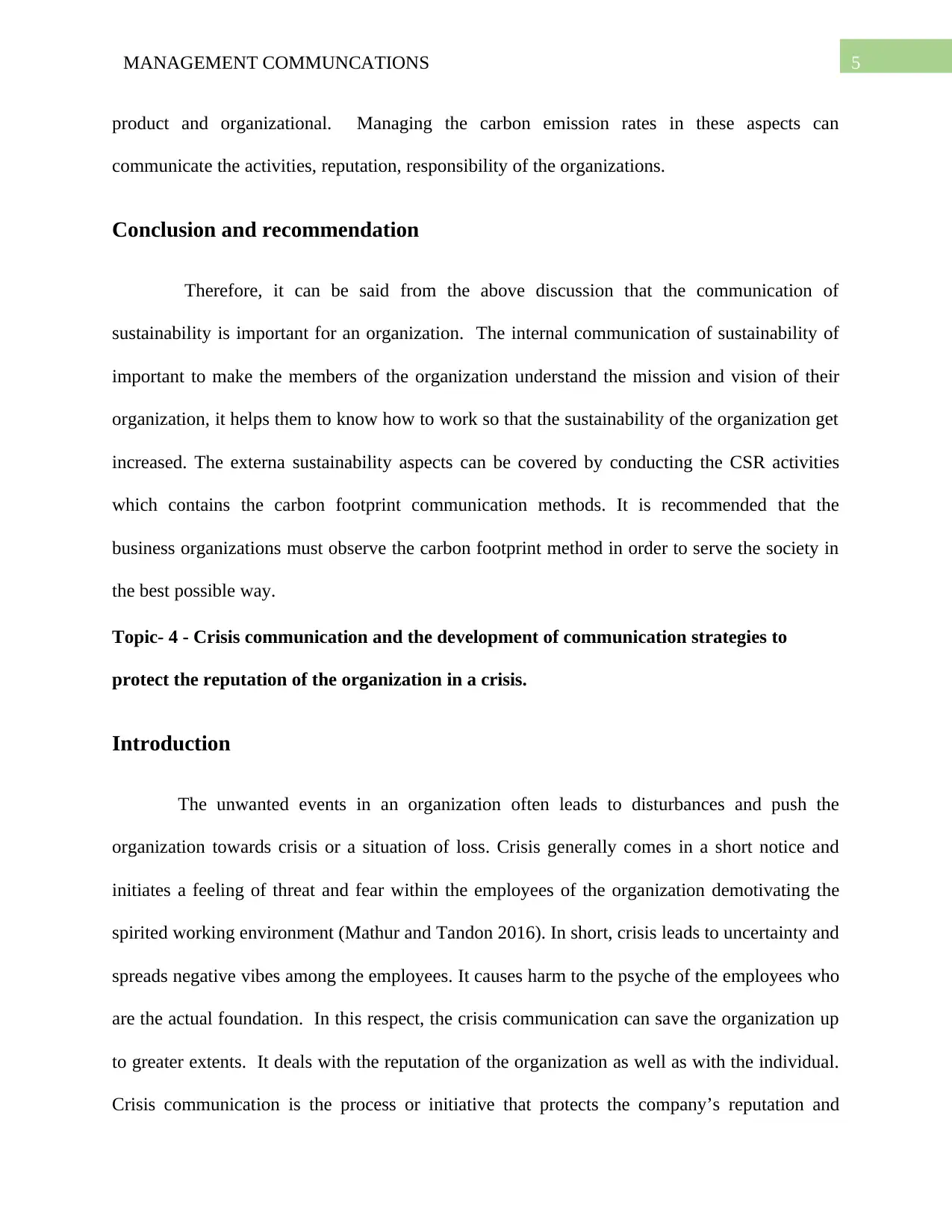
5MANAGEMENT COMMUNCATIONS
product and organizational. Managing the carbon emission rates in these aspects can
communicate the activities, reputation, responsibility of the organizations.
Conclusion and recommendation
Therefore, it can be said from the above discussion that the communication of
sustainability is important for an organization. The internal communication of sustainability of
important to make the members of the organization understand the mission and vision of their
organization, it helps them to know how to work so that the sustainability of the organization get
increased. The externa sustainability aspects can be covered by conducting the CSR activities
which contains the carbon footprint communication methods. It is recommended that the
business organizations must observe the carbon footprint method in order to serve the society in
the best possible way.
Topic- 4 - Crisis communication and the development of communication strategies to
protect the reputation of the organization in a crisis.
Introduction
The unwanted events in an organization often leads to disturbances and push the
organization towards crisis or a situation of loss. Crisis generally comes in a short notice and
initiates a feeling of threat and fear within the employees of the organization demotivating the
spirited working environment (Mathur and Tandon 2016). In short, crisis leads to uncertainty and
spreads negative vibes among the employees. It causes harm to the psyche of the employees who
are the actual foundation. In this respect, the crisis communication can save the organization up
to greater extents. It deals with the reputation of the organization as well as with the individual.
Crisis communication is the process or initiative that protects the company’s reputation and
product and organizational. Managing the carbon emission rates in these aspects can
communicate the activities, reputation, responsibility of the organizations.
Conclusion and recommendation
Therefore, it can be said from the above discussion that the communication of
sustainability is important for an organization. The internal communication of sustainability of
important to make the members of the organization understand the mission and vision of their
organization, it helps them to know how to work so that the sustainability of the organization get
increased. The externa sustainability aspects can be covered by conducting the CSR activities
which contains the carbon footprint communication methods. It is recommended that the
business organizations must observe the carbon footprint method in order to serve the society in
the best possible way.
Topic- 4 - Crisis communication and the development of communication strategies to
protect the reputation of the organization in a crisis.
Introduction
The unwanted events in an organization often leads to disturbances and push the
organization towards crisis or a situation of loss. Crisis generally comes in a short notice and
initiates a feeling of threat and fear within the employees of the organization demotivating the
spirited working environment (Mathur and Tandon 2016). In short, crisis leads to uncertainty and
spreads negative vibes among the employees. It causes harm to the psyche of the employees who
are the actual foundation. In this respect, the crisis communication can save the organization up
to greater extents. It deals with the reputation of the organization as well as with the individual.
Crisis communication is the process or initiative that protects the company’s reputation and
⊘ This is a preview!⊘
Do you want full access?
Subscribe today to unlock all pages.

Trusted by 1+ million students worldwide
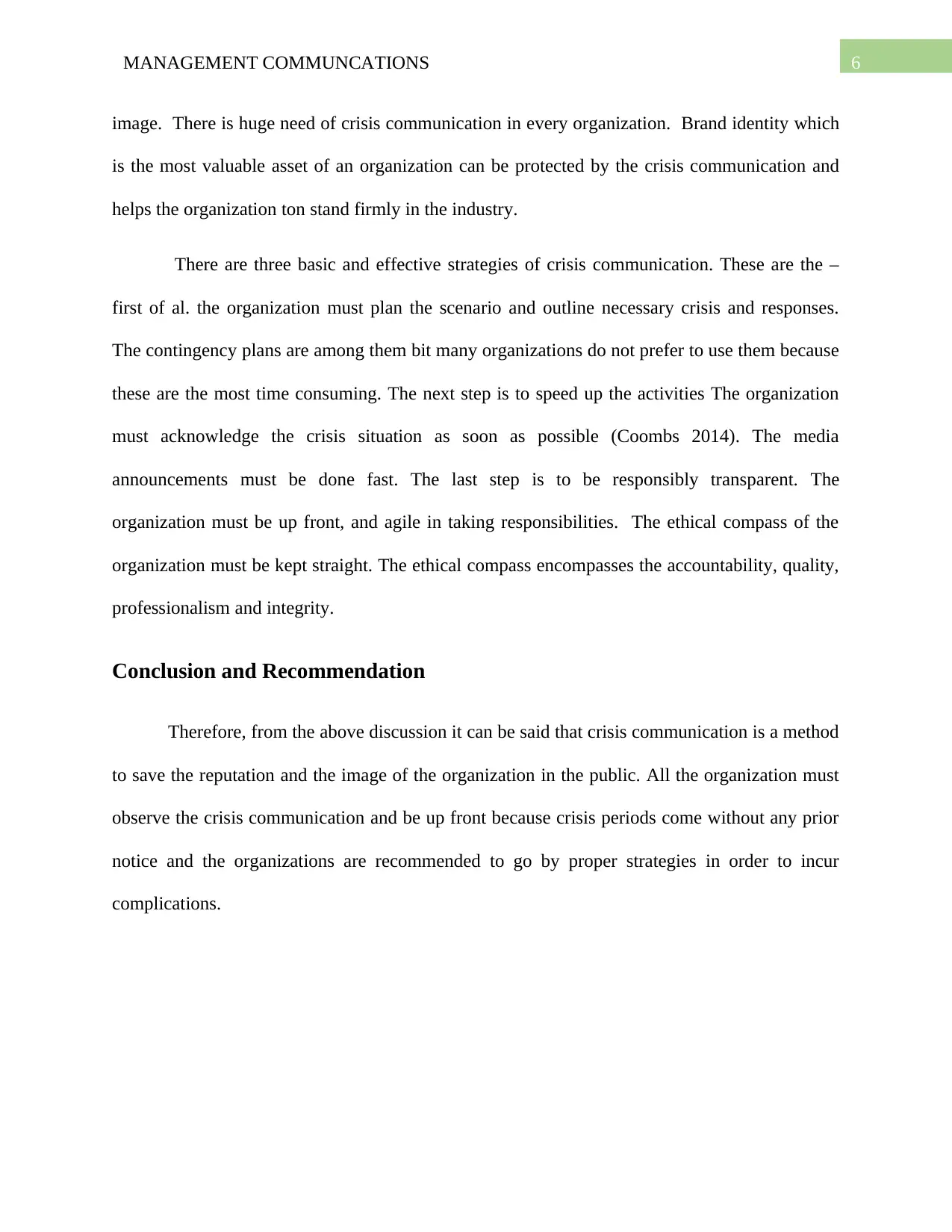
6MANAGEMENT COMMUNCATIONS
image. There is huge need of crisis communication in every organization. Brand identity which
is the most valuable asset of an organization can be protected by the crisis communication and
helps the organization ton stand firmly in the industry.
There are three basic and effective strategies of crisis communication. These are the –
first of al. the organization must plan the scenario and outline necessary crisis and responses.
The contingency plans are among them bit many organizations do not prefer to use them because
these are the most time consuming. The next step is to speed up the activities The organization
must acknowledge the crisis situation as soon as possible (Coombs 2014). The media
announcements must be done fast. The last step is to be responsibly transparent. The
organization must be up front, and agile in taking responsibilities. The ethical compass of the
organization must be kept straight. The ethical compass encompasses the accountability, quality,
professionalism and integrity.
Conclusion and Recommendation
Therefore, from the above discussion it can be said that crisis communication is a method
to save the reputation and the image of the organization in the public. All the organization must
observe the crisis communication and be up front because crisis periods come without any prior
notice and the organizations are recommended to go by proper strategies in order to incur
complications.
image. There is huge need of crisis communication in every organization. Brand identity which
is the most valuable asset of an organization can be protected by the crisis communication and
helps the organization ton stand firmly in the industry.
There are three basic and effective strategies of crisis communication. These are the –
first of al. the organization must plan the scenario and outline necessary crisis and responses.
The contingency plans are among them bit many organizations do not prefer to use them because
these are the most time consuming. The next step is to speed up the activities The organization
must acknowledge the crisis situation as soon as possible (Coombs 2014). The media
announcements must be done fast. The last step is to be responsibly transparent. The
organization must be up front, and agile in taking responsibilities. The ethical compass of the
organization must be kept straight. The ethical compass encompasses the accountability, quality,
professionalism and integrity.
Conclusion and Recommendation
Therefore, from the above discussion it can be said that crisis communication is a method
to save the reputation and the image of the organization in the public. All the organization must
observe the crisis communication and be up front because crisis periods come without any prior
notice and the organizations are recommended to go by proper strategies in order to incur
complications.
Paraphrase This Document
Need a fresh take? Get an instant paraphrase of this document with our AI Paraphraser
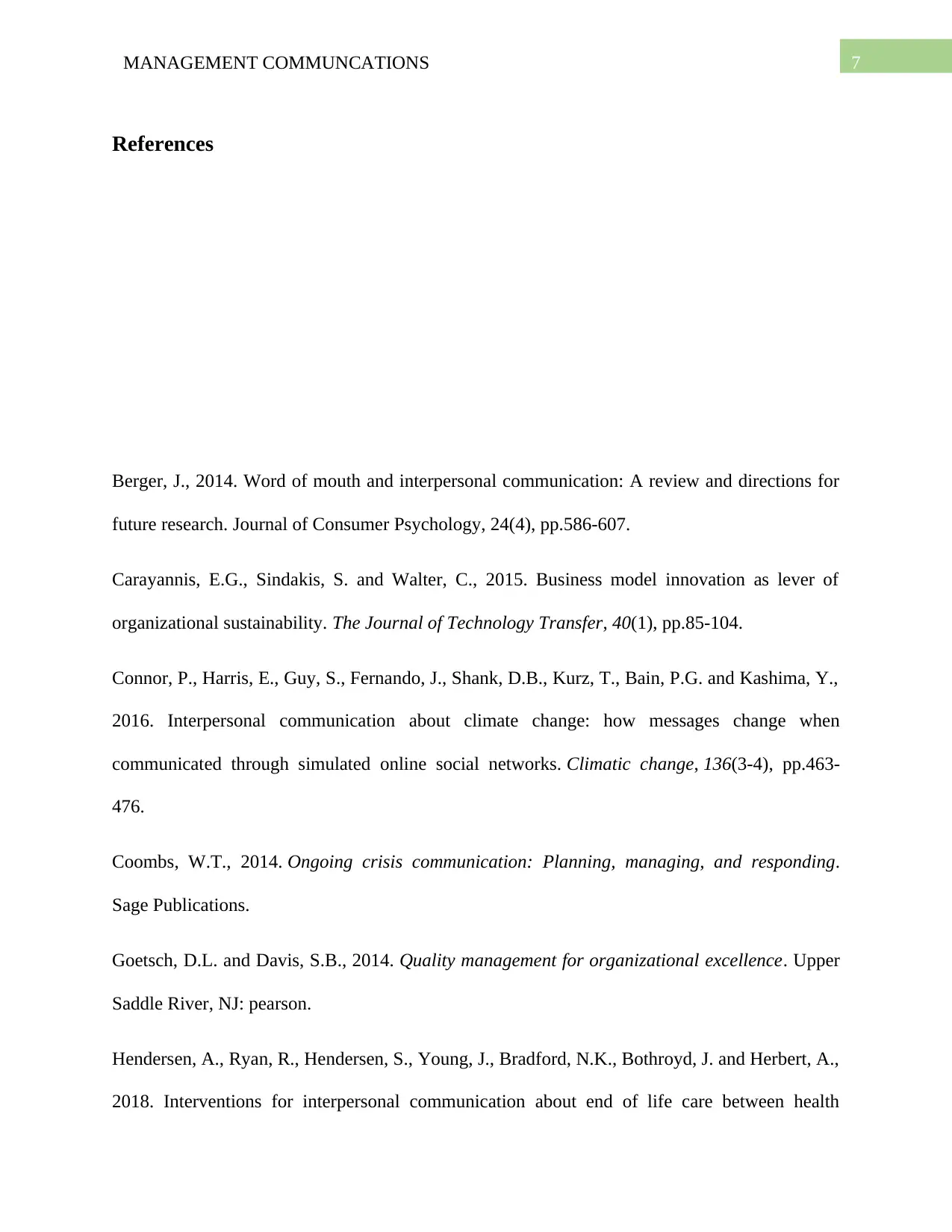
7MANAGEMENT COMMUNCATIONS
References
Berger, J., 2014. Word of mouth and interpersonal communication: A review and directions for
future research. Journal of Consumer Psychology, 24(4), pp.586-607.
Carayannis, E.G., Sindakis, S. and Walter, C., 2015. Business model innovation as lever of
organizational sustainability. The Journal of Technology Transfer, 40(1), pp.85-104.
Connor, P., Harris, E., Guy, S., Fernando, J., Shank, D.B., Kurz, T., Bain, P.G. and Kashima, Y.,
2016. Interpersonal communication about climate change: how messages change when
communicated through simulated online social networks. Climatic change, 136(3-4), pp.463-
476.
Coombs, W.T., 2014. Ongoing crisis communication: Planning, managing, and responding.
Sage Publications.
Goetsch, D.L. and Davis, S.B., 2014. Quality management for organizational excellence. Upper
Saddle River, NJ: pearson.
Hendersen, A., Ryan, R., Hendersen, S., Young, J., Bradford, N.K., Bothroyd, J. and Herbert, A.,
2018. Interventions for interpersonal communication about end of life care between health
References
Berger, J., 2014. Word of mouth and interpersonal communication: A review and directions for
future research. Journal of Consumer Psychology, 24(4), pp.586-607.
Carayannis, E.G., Sindakis, S. and Walter, C., 2015. Business model innovation as lever of
organizational sustainability. The Journal of Technology Transfer, 40(1), pp.85-104.
Connor, P., Harris, E., Guy, S., Fernando, J., Shank, D.B., Kurz, T., Bain, P.G. and Kashima, Y.,
2016. Interpersonal communication about climate change: how messages change when
communicated through simulated online social networks. Climatic change, 136(3-4), pp.463-
476.
Coombs, W.T., 2014. Ongoing crisis communication: Planning, managing, and responding.
Sage Publications.
Goetsch, D.L. and Davis, S.B., 2014. Quality management for organizational excellence. Upper
Saddle River, NJ: pearson.
Hendersen, A., Ryan, R., Hendersen, S., Young, J., Bradford, N.K., Bothroyd, J. and Herbert, A.,
2018. Interventions for interpersonal communication about end of life care between health
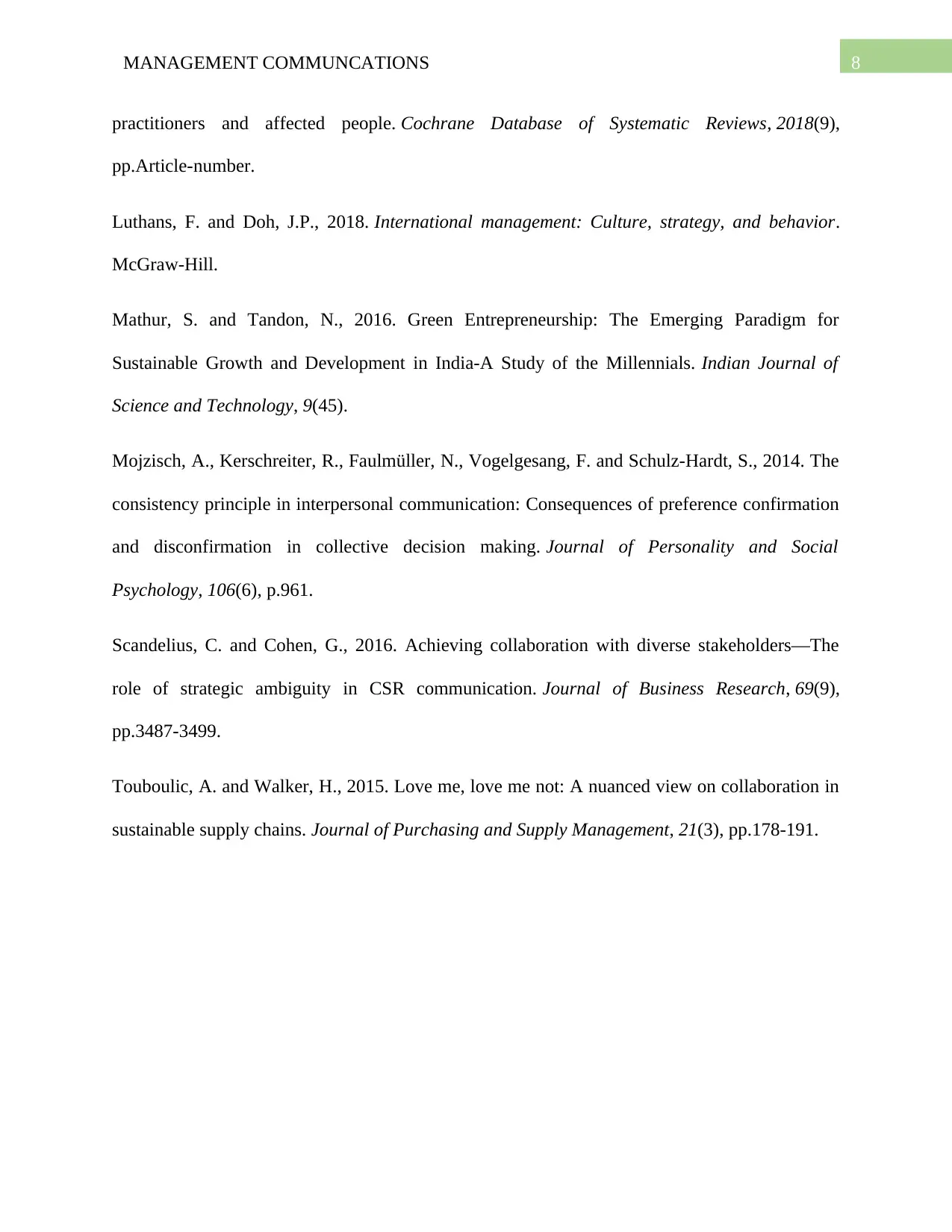
8MANAGEMENT COMMUNCATIONS
practitioners and affected people. Cochrane Database of Systematic Reviews, 2018(9),
pp.Article-number.
Luthans, F. and Doh, J.P., 2018. International management: Culture, strategy, and behavior.
McGraw-Hill.
Mathur, S. and Tandon, N., 2016. Green Entrepreneurship: The Emerging Paradigm for
Sustainable Growth and Development in India-A Study of the Millennials. Indian Journal of
Science and Technology, 9(45).
Mojzisch, A., Kerschreiter, R., Faulmüller, N., Vogelgesang, F. and Schulz-Hardt, S., 2014. The
consistency principle in interpersonal communication: Consequences of preference confirmation
and disconfirmation in collective decision making. Journal of Personality and Social
Psychology, 106(6), p.961.
Scandelius, C. and Cohen, G., 2016. Achieving collaboration with diverse stakeholders—The
role of strategic ambiguity in CSR communication. Journal of Business Research, 69(9),
pp.3487-3499.
Touboulic, A. and Walker, H., 2015. Love me, love me not: A nuanced view on collaboration in
sustainable supply chains. Journal of Purchasing and Supply Management, 21(3), pp.178-191.
practitioners and affected people. Cochrane Database of Systematic Reviews, 2018(9),
pp.Article-number.
Luthans, F. and Doh, J.P., 2018. International management: Culture, strategy, and behavior.
McGraw-Hill.
Mathur, S. and Tandon, N., 2016. Green Entrepreneurship: The Emerging Paradigm for
Sustainable Growth and Development in India-A Study of the Millennials. Indian Journal of
Science and Technology, 9(45).
Mojzisch, A., Kerschreiter, R., Faulmüller, N., Vogelgesang, F. and Schulz-Hardt, S., 2014. The
consistency principle in interpersonal communication: Consequences of preference confirmation
and disconfirmation in collective decision making. Journal of Personality and Social
Psychology, 106(6), p.961.
Scandelius, C. and Cohen, G., 2016. Achieving collaboration with diverse stakeholders—The
role of strategic ambiguity in CSR communication. Journal of Business Research, 69(9),
pp.3487-3499.
Touboulic, A. and Walker, H., 2015. Love me, love me not: A nuanced view on collaboration in
sustainable supply chains. Journal of Purchasing and Supply Management, 21(3), pp.178-191.
⊘ This is a preview!⊘
Do you want full access?
Subscribe today to unlock all pages.

Trusted by 1+ million students worldwide
1 out of 9
Related Documents
Your All-in-One AI-Powered Toolkit for Academic Success.
+13062052269
info@desklib.com
Available 24*7 on WhatsApp / Email
![[object Object]](/_next/static/media/star-bottom.7253800d.svg)
Unlock your academic potential
Copyright © 2020–2026 A2Z Services. All Rights Reserved. Developed and managed by ZUCOL.





